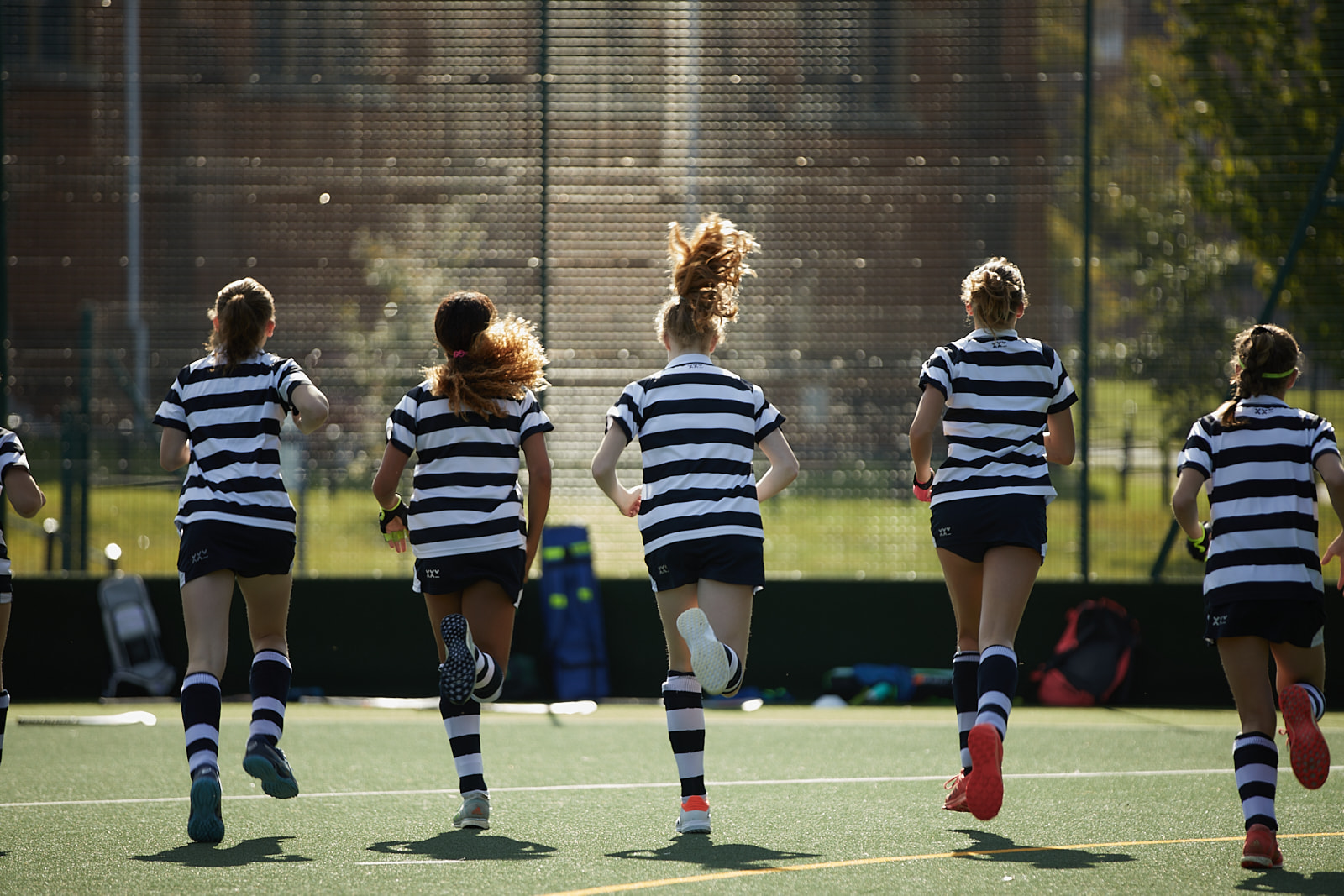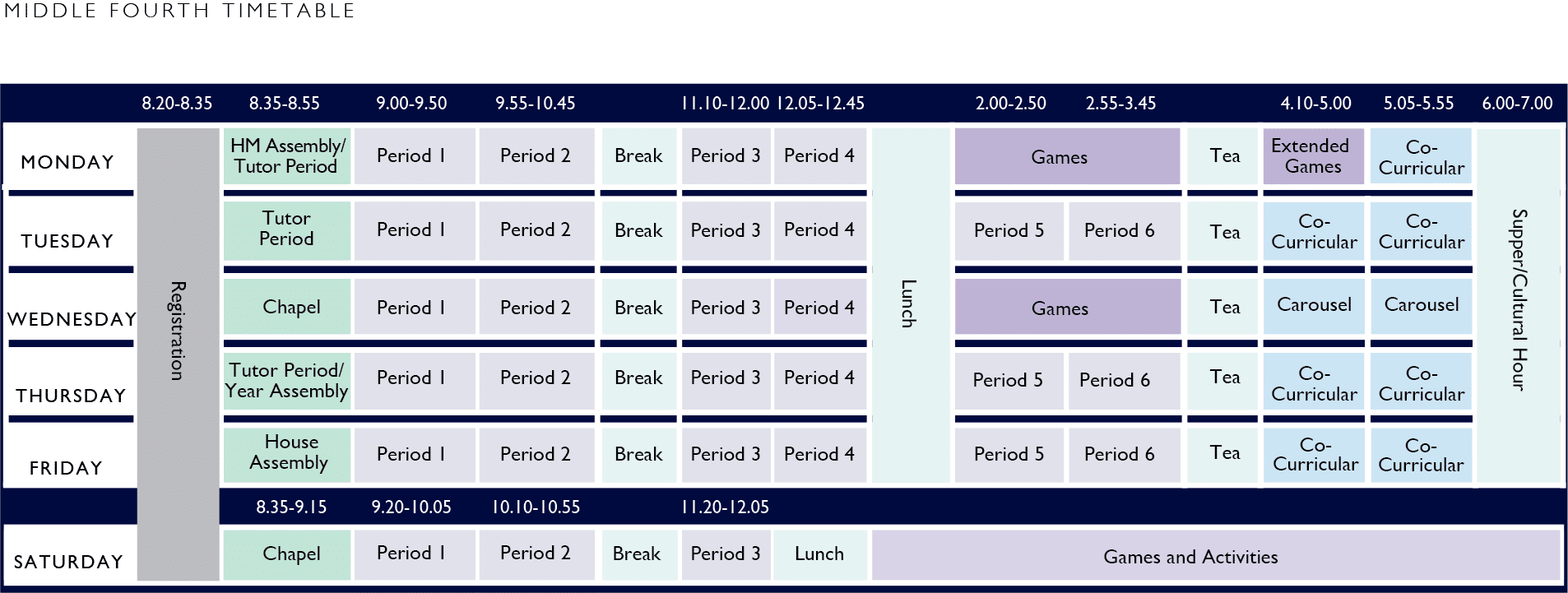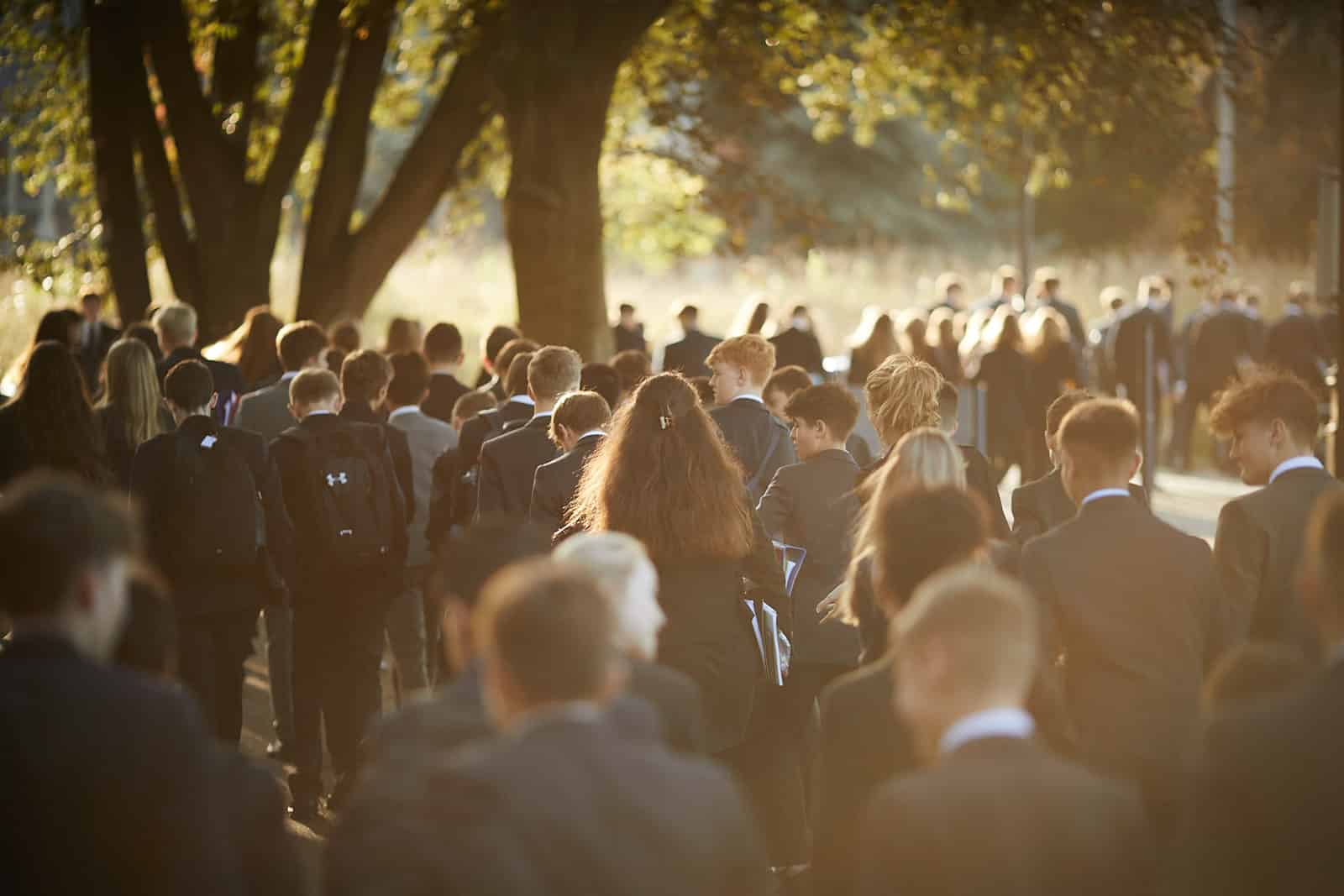The School Day
The image below shows you what a typical week will look like for your child in Year 9 (M4). Each day starts with registration at 8.20am followed by an assembly, tutor time or Chapel. Lessons begin at 9am, and each period lasts 50 minutes. Morning break is 10.45-11.10am, when your child can return to their House for snacks and refreshments.
Your child has two more lessons and then – between 12.55-2pm – it’s lunch. The whole school eats in the Dining Hall, and times are staggered by year group, so there is always room to sit with friends.
Afternoons vary, depending on the day, but each ends with some form of co-curricular activity (more on that below).
The School day ends at 6pm, and you are welcome to collect your child at this time. College transport departs at 6.15pm. However, on several days each term there are further opportunities for enrichment during the Cultural Hour, including guest lectures, performances, readings, and plays.
Saturdays
Saturday School begins in Year 9.
The day begins with Chapel at 8.35am. Epsom College is a Church of England school, but pupils of other faiths are an important part of our community and are able to practice their faith at the College. Our Chaplaincy team includes a Hindu Priest, Muslim Imam and a Rabbi.
Saturday morning service is then followed by three 45-minute lessons, and lunch at midday. Fixtures take place in the afternoon, and the school day concludes once games end.
Exeat Weekends
As you are new to the school, and therefore potentially new to the conventions of boarding schools, you may be unaware of ‘Exeat’ weekends.
These are compulsory breaks, when the school shuts down for two nights to give everyone – pupils and staff alike – the chance of a well-earned rest.
Dates will change, and are published on the Term Dates page of the website, but we generally have five Exeat weekends a year (two in Michaelmas Term, two in Lent Term and one in Summer Term).
Which lessons are on offer in M4?
All pupils study the following:
- Art
- Biology
- Chemistry
- Computer Science
- Design & Technology
- Drama
- English
- Geography
- History
- Maths
- Modern Language (from French, German or Spanish)
- Music
- PE
- PSHE (including Citizenship)
- Physics
- Religious Studies
- Science (Biology, Chemistry and Physics taught separately)
Pupils have the option of studying a second Modern Language (from those listed above), Latin or Classical Civilisation.
When else is studied?
Afternoons vary from day-to-day. After lunch on Monday and Wednesday, your child takes part in games and/or fixtures. Monday’s session is an ‘extended Games session’ running through until 5pm.
On Tuesday, Thursday and Friday, academic lessons continue until 3.45pm.
Each day ends with some form of Co-Curricular Activity. ‘Activities’ are chosen by the pupil, while ‘Carousel’ activities are taken by all pupils, on rotation. This combination means pupils are able to indulge their passions and interests, while also learning how to be more open-minded in their approach to new challenges and experiences.
In their Summer Term, all pupils get to sample CCF (Combined Cadet Force). Epsom offers one of the UK’s largest tri-service CCF, where the focus is on developing life skills, teamwork and leadership. In Year 10 pupils opt to join either the Amry, Navy or RAF CCF, or take the Duke of Edinburgh Silver Award.
How much homework will be set?
Your child will be given about 1.5 hours of homework (or Prep, as we call it) each day, including weekends. No homework should be set over Exeat weekends.
In Years 10 and 11, this will increase to 2 hours per day. In Sixth Form, your child would be expected to do around 15 hours of Prep each week.
Teachers follow a Prep Timetable, so that pupils should be able to plan their time and manage this workload effectively. It is normal for Day pupils to be able to do most of their Prep while at College (if they are organised!).
How does reporting work?
There are five reporting cycles equally spaced over the course of your child’s academic year. The reports are organised so that you have detailed written or verbal feedback on the academic progress being made by your child once a term.
Two of these reports are grade reports, with pastoral comments from their tutor. Grade reports offer an attainment grade, based on the GCSE grades we believe your child is on course to attain at the end of Year 11, plus effort grades for work in class and at home. These effort grades are out of five, with five being the top. While attainment is obviously important, we are probably more interested in the effort grades at this stage of your child’s education – as they offer a better indicator of how pupils will meet or exceed their objectives.
Two reports feature written comments from their subject teachers and a pastoral report from their Housemaster or Housemistress. The fifth report, at the midpoint of your child’s academic year, is a grade report which is followed by the opportunity for you to speak to your child’s subject teachers at a parents’ evening.
GCSEs
Year 9 is preparation for studying GCSE subjects, which are followed in earnest in Years 10 and 11 (Upper Fourth and Fifth Form, in Epsom-speak).
The vast majority of Year 10 pupils will study ten GCSEs or IGCSEs. Seven are compulsory and three are optional. In addition, everyone will continue with Physical Education and follow the PSHE programme. Full details are below.
What are the compulsory GCSE subjects?
The vast majority of pupils entering Year 10 will take ten GCSE/IGCSE subjects. Seven are compulsory, the remaining three are optional. The compulsory subjects are:
English
For the vast majority, this will lead to IGCSE in both English Language and English Literature.
Modern or classical language
You must choose one language from:
- French
- German
- Spanish
- Latin
- Classical Civilisation
Aspiring linguists can take an additional language as an optional subject. This would be either French, Spanish or Latin.
Pupils who study English as an Additional Language will take this as their Modern Language. They may take French, Spanish or Latin as their optional subject.
Mathematics
All sets will sit IGCSE in Year 11. Depending on progress, pupils in the top set(s) may sit Further Mathematics as an additional IGCSE.
Science
All pupils study Biology, Chemistry and Physics as single sciences. All pupils take Biology, Chemistry and Physics IGCSE. The Science departments regularly review courses to ensure that they are suited to pupils’ abilities and may choose to introduce Dual or Single Science IGCSE for selected pupils.
Which are the optional GCSEs?
Pupils will need to choose three options from the list below. All optional subjects are taught in mixed-ability groups.
- Art
- Computer Science
- Design & Technology
- Drama
- French
- Geography
- History
- Latin
- Music
- Photography
- Physical Education
- Religious Studies
- Spanish
Pupils who study English as an Additional Language will take this as their compulsory Modern Language. They may take French, Spanish or Latin as their optional subject.
When do these choices have to be made?
Pupils and parents are invited to attend a GCSE Choices Information Evening in early March of Year 9. Choices are then made just before the end of March.
Your tutors and academic staff will be happy to talk you through the various options. They can help to ensure that you are making the best choices with consideration for any thoughts you have regarding your A-levels or – for those who are thinking that far in advance – higher education and careers.
Digital Literacy
One of the key aims of an Epsom College education is to prepare young people for the world they will inhabit when they move on from the College. It will be a world where knowledge and use of technology and Artificial Intelligence will be crucial and, therefore, pupils will be emersed in the productive and responsible use of technology at the College.
All Middle Fourth pupils will be issued with a Surface Pro Tablet with stylus which allows them to take notes and access multimedia resources with their device. In most subjects, the laptop will act as a digital exercise book with pupils (importantly) writing into OneNote whilst accessing resources. Teachers can access the pupils’ work in real time and provide feedback.
The pupils will learn how to use their device and the Office 365 suite of applications – in particular OneNote, Teams and Outlook. All of their prep will be set as Teams assignments which will sync with their timetable in Outlook allowing them to stay organized and on top of work. Support videos and resources are available to assist as needed.
The devices are carefully controlled by the College and during lessons are locked into just the app that is in use and are remotely shut down at appropriate times.



